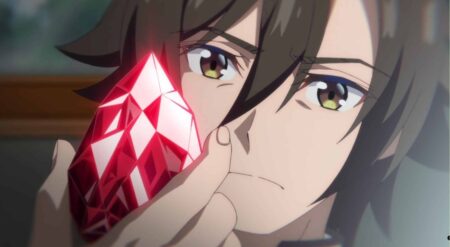
The levels of heartache that flow through Skip and Loafer Episode 11 are matched only with the empathetic lens each character is depicted through. Each week the P.A. Works series continues to rise to an incredible level of quality, and each week it becomes increasingly difficult to come up with new ways to explain just how beautiful this series is. With those more prone to action-based series, Skip and Loafer offers an obvious deterrent with its easy charm and slice-of-life structure, but there’s a universal appeal, a certain tenderness, that draws in all viewers who settle in to watch. “Hype and Excitement” further delivers on this idealogy with an episode enriched with character development, dynamic writing, and an earned moment of emotional catharsis as the characters see themselves and their capacity for growth through those they surround themselves with.
The episode uses the much talked about school festival as more of a set rather than allowing its functions of it to dominate. This means that while other series, such as the also wonderful Komi Can’t Communicate, might focus fully on the Maid Cafe the class is putting on, Skip and Loafer allows the class objectives to play second fiddle. We see Shima engage in the class musical, but there was more emphasis put on the play and the workings of rehearsing for it in Episode 10. “Hype and Excitement,” meanwhile, is preoccupied with what this communal experience means for characters like Mitsumi and Shima. Noted in the episode, it’s been only six months since school started, and yet the small shifts we’ve seen them go through, the character development that might seem inconsequential to some but is monumental to others, have been immense.
For a moment, the episode deals with a heavy thought as Mitsumi realizes that everyone around her, having grown up in Tokyo, has friends from other schools and family attending the festival. The animation cements this idea of loneliness by positioning her under a spotlight, isolated from his classmates. She seems about ready to tough it out before being rallied by the three friends — aside from Shima — who she’s grown closest to. They might not understand what she’s going through in this instance, and that makes it even more significant in emotional potency because it depicts how naturally the four of them all gravitate toward one another.
In a few brief sequences, we get to witness some of those aforementioned monumental changes. Kurume recognizes Murashige’s discomfort when facing Kurume’s middle school friends, who are intimidated by her, and uses their friendship to lift Murashige’s spirits and shine a light on the bond they’ve developed. Later, in a smaller moment of grace, we watch as Egashira races toward Kurume, Murashige, and Mitsumi, whining about wanting a churro before being given one. This later example is more significant when remembering that, earlier in the season, she wouldn’t eat anything that wasn’t considered a healthy snack in front of others due to her negative self-image and past of being ignored due to her weight. But such is the beauty of this series which understands that some of the most complex moments in our lives, the ones that truly allow us to set forth a new path, are ones that, to anyone else, may appear to be non-issues.

This is just part of the episode’s many achievements. Shima, meanwhile, is on his journey of self-reflection, though he doesn’t realize it at the time. As we saw last episode, his mom has discovered the musical he’s partaking in and has come to see it, bringing along his three-year-old brother. The three-year-old brother promptly becomes lost and makes their way to the classroom where Shima’s classmates and friends reside. As they all divide and conquer to find his mom, find Shima, and distract the child so that he doesn’t falter under the stress of the situation. It’s such a small beat, but again, the fact that the series makes such efforts and remembers the natural kindness people possess is refreshing.
We’ve learned that Shima doesn’t understand how to have a relationship with his brother, and his friend calls him out on it in Episode 11 by reminding him that most three-year-olds just want to exist in the same space as their older brothers. We see Keiri in flashbacks, often existing on the periphery of Shima’s world, watching him from partly closed doors and bolting away when he comes into view. Shima finds him timid, and his friend quickly states otherwise, calling Keiri a chatterbox. The truth is that Keiri is only timid around Shima because he, too, is like his brother and, even at just three, is trying to appease those around him. So he makes himself scared. Children are perceptive, and even if Keiri can’t understand the extent of the inner turmoil Shima is experiencing, he can sense the tension.
It’s why the scene in which Keiri breaks down, after keeping up a brave face all day, once he sees Shima is so devastating in its raw honesty. It’s similar to when a kid trips and scrapes their knee, but the tears only begin to bubble over once an adult has acknowledged it and asked them if it’s okay or if it hurts. Keiri was able to soldier on until he saw his older brother, knew he’d been found after being lost from his mom, and was able to safely wail into Shima’s arms.
Shima could’ve been nothing more than a character for Mitsumi to admire, utilized as merely one side of the romantic trope. Instead, he’s become just as intriguing a character as Mitsumi, as he’s constantly being challenged to either improve upon himself or forgive past him. His embrace of Keiri is an action of closure as much as it is a declarative character statement, that even with all the popularity he possesses, Shima is just as likely to have to endure personal hardship as any other character.
As Mitsumi states, “Everyone has their own issue,” a statement that could become the thesis for the entire series.
Skip and Loafer Episode 11 triumphs in small moments of human compassion. The sincerity of the storytelling, the soft and hazy animation, plus the detailed character developments continue to strengthen what might be the best anime of the year so far.
Skip and Loafer Season 1 is available on Crunchyroll.
Skip and Loafer Episode 11
-
Rating - 10/1010/10
TL;DR
Skip and Loafer Episode 11 triumphs in small moments of human compassion. The sincerity of the storytelling, the soft and hazy animation, plus the detailed character developments continue to strengthen what might be the best anime of the year so far.






